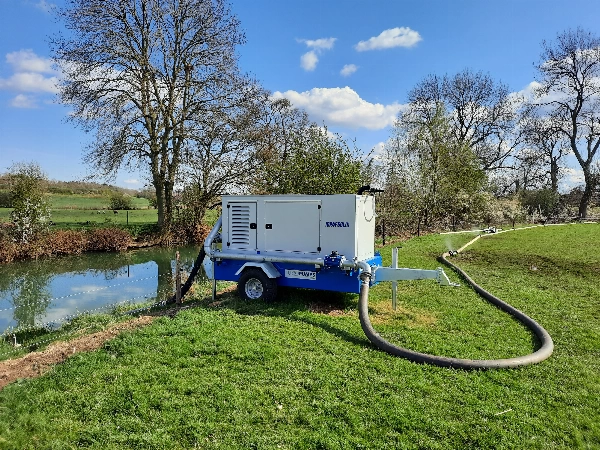Irrigation farming systems play an important role in modern agriculture, as they are used to distribute water to crops, allowing optimum crop growth and preventing resource wastage. These irrigation systems allow farmers to provide water to crops in a controlled and precise manner. Crops, in general have different water needs, and with this system farmers can tailor and measure how much water each plant is getting. A well-designed irrigation system has many components including sprinklers, irrigation hose reels, irrigation pumps, gauges, and soil sensors.
Nowadays, advanced irrigation systems in agriculture incorporate a concept called the Internet of Things (IoT), which essentially integrates various irrigation equipment into a single network, allowing farmers and estate managers to monitor their irrigation system and analyse data to identify how they can yield an optimum harvest.
Types of irrigation systems in agriculture
There are various types of irrigation equipment that have been developed to suit different agricultural needs, environmental conditions, and types of crops. The system a farmer uses can be specifically tailored based on their estate and crop needs. Each irrigation equipment has its own advantages and is designed to address specific challenges when it comes to watering crops.
Watering crops with drip Irrigation
Drip irrigation is an efficient method of crop irrigation that operates by delivering water directly to the plants roots through a network of pipes, valves, and drippers (also known as irrigation emitters). A drip irrigation system is suitable when distributing water to row crops, and an efficient method to use when aiming to deliver water in an efficient and targeted way.
- The advantages of drip irrigation systems are as follows:
- Efficient method for water distribution
- Keeps water wastage at a minimum
- Allows farmers to have precise control of water and nutrient delivery to crops
Although drip irrigation systems can be pricey to set up, in the long run due to the amount of time and resources saved, it is a worthwhile investment.
Precision irrigation systems
Precision irrigation systems are noted as an advanced approach for water distribution as it uses technology to optimise the amount of water delivered to crops based on real-time data. The date takes into account soil moisture levels, the weather conditions and needs of the crops. This irrigation system is useful in areas where there is changeable weather, crops that have specific needs, crops that are prone to damage or disease and large-scale farming operations.
The advantages of precision irrigation systems are:
- Maximises the efficiency of water distribution
- Improves crop yield and its quality
- As the system is automated it prevents errors from occurring and reduces labour time and resource costs
Sprinkler irrigation systems for optimising crops
The goal of sprinkler irrigation systems is to distribute water via a network of pipes, which spray the water into the air, and it mimics water rainfall like rainfall. This irrigation system is beneficial when irrigating crops that are high up like sweetcorn. These systems can also be used to distribute weed and nutrient solutions to crops.
The advantages of sprinkler irrigation systems are as follows:
- Multi-purposeful, they can be used to distribute water, promote crop health, and control weed
- Frost protection, the system can be put in place to release a consistent amount of water on the crops during cold temperatures (when plants are likely to be affected by frost), preventing frost damage from occurring
- Saves time and costs
One thing to note about sprinkler systems is that water can be lost through the process of evaporation and wind drift. However, it is beneficial for frost protection.
Irrigation equipment here at AMTEC
For estate managers, farmers, and agronomists, partnering with a reliable irrigation equipment supplier is essential to optimising and enhancing crop yields and efficiency. Here are some top picks from the team here at AMTEC, with some commentary from our experts to help guide you through the need to knows of irrigation equipment and systems.
Here at AMTEC our irrigation pumps are typically driven by a Tier-3 diesel powered engine; which doesn't use AdBlue (which is notorious for giving issues).
Typically, an ICX110-50/FL, which is the Idrofoglia model of Turbopump, and an ICX160-40/FL will meet pretty much every farmer's needs in the UK about 80 to 90% of the time. An ICX110-50/FL pump consists of an Iveco 4-cylinder engine producing 100hp bolted to a Caprari MEC80-4/3a pump and can typically run 2 reels with guns. This is the most commonly purchased model at AMTEC. The priming system is automatic as standard. When the suction pipe is connected to a water source, it creates a vortex, which draws up the water and floods the pump; effectively priming it. This priming process can be done in about 30 seconds; much faster than doing this the old manual way.
Designing an effective farm irrigation system
When designing and creating an efficient farm irrigation system requires careful consideration of various factors unique to each agricultural operation. Farmers should take into account:
- Soil type and water retention capacity
- Crop water requirements throughout the growing season
- Local climate and rainfall patterns
- Field topography and size
What farmers and estate managers should consider when choosing the right irrigation system
When selecting an irrigation system, farmers and estate managers should consider the following:
- Initial costs vs. long-term savings
- Water availability, preventing water wastage and costs
- Labor requirements for operation and maintenance
- Compatibility with existing farm equipment and practices
It's worth noting that purchasing quality used farming machinery can significantly reduce initial costs whilst still providing efficient irrigation solutions for you.
Different crops may require different approaches. For instance, an herb farm might benefit from a precise micro-irrigation system, while a large corn field might be better served by a drip irrigation system.
Advanced irrigation techniques often incorporate modern technology, such as soil moisture sensors, considers real-time weather conditions, and automated control systems, allowing for more precise and efficient crop irrigation. This can be beneficial for various crop types.
Summary
Implementing an effective irrigation system is crucial for farmers and estate managers of all scales, from small operations to large commercial farms. The right irrigation farming approach can significantly boost crop yields, improve water use efficiency, and streamline your overall agricultural operations. As irrigation methods continue to advance, staying up to date with the latest technologies and practices can help you maintain a competitive edge in the ever-evolving agricultural space.








